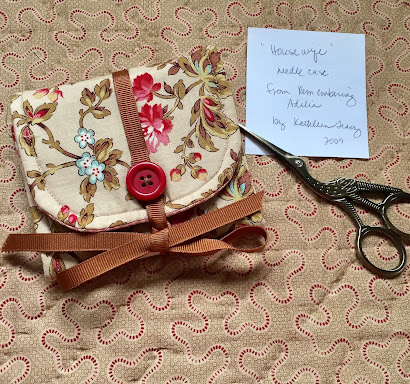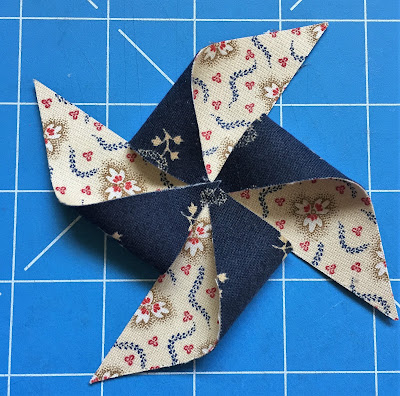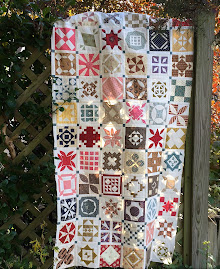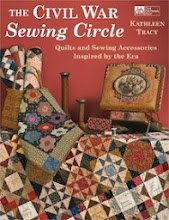A few years ago I taught at a quilting retreat and someone brought in her collection of antique sewing kits from the 19th century. I've had needle cases on my mind lately and so I thought I'd show you a few pics of the antique ones she showed the group.
This case is made of leather with a green silk lining. Exquisite. A beautiful assortment of threads.
The needle holder on this one is embellished with a small blanket stitch and embroidered flowers. So sweet.
Since all of an Early American household's cloth items had to be sewn by hand, hand sewing was an important skill for most females in the 1800s and earlier. These skills were of necessity passed down from mother to daughter at a very early age. Thus, young girls (some as young as twelve) were often very accomplished at needlework. In addition to sewing and mending garments for the family, we can see many of their skills evidenced in needlepoint samplers of the time period and other fancy work such as embroidery.
Sewing kits were often very personal items and women took care with their contents. Needles, pins and scissors had to be carefully wrapped to protect against rust. Sometimes women ran their needles through the natural oils in their hair to protect them and make them easier to pass through fabric. (We wash our hair much more often than women did in earlier days so I don't think that would work well today!)
This small case is called a Lady's Companion and the other one next to it is also lined in silk. Some of the kits contained bone crochet hooks and stilettos and even a tiny pocket knife.
This purple case came with a note saying "Made by Miss Abby Buckingham and given to me by my mother - 1839." Made of purple velvet and silk with a patent leather outer case.

See the tiny hiding place for the thimble?
Here's a page from an old newspaper folded up into a small packet, unfolded to display some pretty antique glass head pins.
This sewing roll-up contained needles organized by size. Numbers are embroidered in the different sections so every needle has a place. What an organized sewer!
It would be fun to collect some of these antique sewing kits, wouldn't it? For now, I'll just have to content myself with making sewing kits of my own to cherish and perhaps one day they will be passed along and kept among someone else's treasured possessions.
After looking at these pictures, I pulled out a few of the needle cases I've made for myself and friends over the years. FYI - There's a cool pattern for a "huswife" needlecase in my book Remembering Adelia.
There are some simple fabric envelopes in The Civil War Sewing Circle book that you can make to hold sewing things.
There's even a pattern for a small needle book in my first book American Doll Quilts.
After looking through some of these I decided I wanted to make a roll up sewing kit. After a little experimenting, I came up with this - The Civil War Ladies' Sewing Case.
During the 18th and 19th centuries, these needle cases or sewing kits with pockets were called "huswifes" or housewives. Used to hold needles, scissors, buttons, thread, they were the essential ladies' home accessory. Soldiers carried them in their knapsacks during the Civil War in order to quickly mend their uniforms or sew on a lost button at camp.


If you're interested in making one of these roll up needle cases, I just listed this as a pattern in my Etsy shop. There are a few kits available as well in a separate listing. I have lots of patterns but limited kits in several different colors to choose from. All are made with assorted reproduction fabrics. The listing on Etsy shows more pictures and gives a description of the kits. E-mail me if you have any questions. (My e-mail is in my Blogger profile.)
A reminder that my older books are out of print now but you can purchase an e-book of any one of them through my publisher, Martingale/That Patchwork Place. Some quilters print them out themselves at a place like Staples or other office supply store from the downloadable .pdf file.
Have a nice weekend!












































